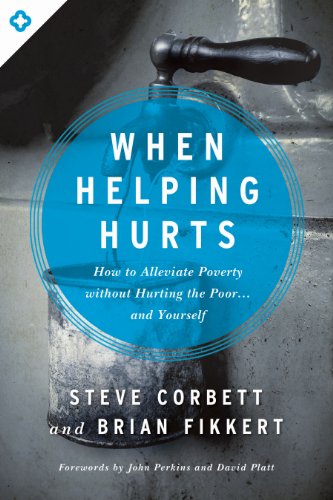When Helping Hurts
How to Alleviate Poverty Without Hurting the Poor . . . and Yourself
Steve Corbett; Brian Fikkert
BOOK REVIEW

In a world where the cries of the impoverished echo louder than ever, When Helping Hurts: How to Alleviate Poverty Without Hurting the Poor . . . and Yourself emerges as not just a book, but a clarion call. Authored by Steve Corbett and Brian Fikkert, this transformative work unravels the complexities of charity and development, laying bare the painful truths of well-meaning interventions that often perpetuate cycles of dependency and helplessness. It's time we confront our motives, our methods, and our impact-not just on the lives of those we aim to assist, but on our own souls as well.
At its core, this book is a fierce indictment of traditional charitable approaches. Corbett and Fikkert don't shy away from the raw reality that many poverty alleviation efforts can inadvertently cause more harm than good. They challenge you to reconsider your understanding of poverty, urging you to delve deeper into its causes and implications. Are we, in our quest to "help," sometimes stripping dignity and agency from the very individuals we wish to uplift? 🌍
The authors' reflections aren't just academic; they're rooted in their experiences in diverse socio-economic environments. With a poignant blend of storytelling and analysis, they illustrate how misguided aid can foster dependency rather than empowerment. Their compelling anecdotes serve as mirrors, reflecting our own biases and preconceived notions. As you navigate through these pages, you feel the weight of accountability pressing down on your conscience. What if every dollar you donated, every initiative you sponsored, inadvertently reinforced the very issues you sought to eradicate?
Critics of this work might argue that it's too harsh or callous. Yet, the most incendiary truths often sting the sharpest. As one reader remarked, "This isn't merely a critique; it's an awakening." The honesty embedded within each chapter implores you to wrestle with discomfort. It resonates with those who have witnessed the fallout of poorly constructed charitable efforts-tales that unfold like tragedies in slow motion, leaving devastation in their wake. 😢
The authors' exploration of poverty goes beyond financial constraints; it acknowledges the holistic nature of human well-being. They posit that poverty is not simply about lack of resources but about broken relationships-in families, communities, and with oneself. This radical rethinking requires a seismic shift in our approach to altruism. By fostering relationships grounded in mutual respect and understanding, we can dismantle the harmful paradigms that have long governed charitable efforts.
Imagine now the collective impact of communities empowered to define their own needs rather than receiving top-down solutions. Think of the radical transformations possible when aid is replaced with partnership. The authors emphasize the importance of listening-truly listening-to the voices of those living in poverty. Through their narrative, you begin to sense a stirring, an urge to engage genuinely with the world around you. You can almost hear the echoes of change resonating in communities worldwide. 🌟
As you delve deeper, the authors intertwine insightful commentary with practical guidance, offering strategies that restore dignity and promote sustainable growth. They dissect common misconceptions perpetuated by donors and organizations alike, dismantling them with eloquent precision. The text melds theory and practice, illustrating that real help often looks different from what we've been taught to believe.
However, not all readers have been enchanted by this title. Some have expressed frustration over its academic tone, arguing that it sometimes feels inaccessible. Yet, therein lies its strength. The complexity of these issues warrants meticulous exploration, challenging you to grapple with profound questions and assumptions. This isn't light reading; it's an invitation to participate in a broader, ongoing dialogue about the ethics of charity and the moral imperatives of effective aid.
So, why should you immerse yourself in When Helping Hurts? Because it provokes you to become an active participant in a critical conversation that transcends borders and socio-economic divides. It compels you to tear down the wall of complacency that too often surrounds charitable acts. You'll find yourself wrestling with ideas long after you've turned the final page. And ultimately, it will push you to re-examine what it truly means to help.
In a world flooded with charity fatigue and questions of efficacy, this book serves as a beacon-a bold, fierce challenge to every reader. By engaging thoughtfully with Corbett and Fikkert's insights, you can redefine your role in alleviating poverty. Don't be just a bystander; be an informed advocate. This isn't merely about changing how we help; it's about reimagining the possibility of genuine empowerment. Are you ready to take the plunge? 🏊?♂️
📖 When Helping Hurts: How to Alleviate Poverty Without Hurting the Poor . . . and Yourself
✍ by Steve Corbett; Brian Fikkert
🧾 288 pages
2014
#when #helping #hurts #alleviate #poverty #without #hurting #poor #yourself #steve #corbett #SteveCorbett #brian #fikkert #BrianFikkert